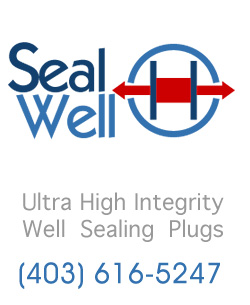The Solution
A solution to the leakage problems that arise is to utilize a material other than cement to seal wells against gas leakage. To be effective, the material should have the following attributes:
- it should be impermeable to gas flow;
- it should form an effective seal both inside and outside steel casing that has been in hydrocarbon service;
- it should be long lasting in contact with acidic hydrocarbons, aqueous acid gas solutions, and saltwater;
- the cost of the quantity of material required and the procedure for placing it should be comparable to or, better yet, substantially less expensive than present conventional plugging methods.
Seal Well uses a bismuth-based fusible metal as the sealing medium, and, in particular, one that is non-toxic and that expands upon solidification from liquid to solid phase. This alloy has exceptional corrosion resistance properties, complete non-toxicity, and functional mechanical properties.
Seal WelI’s approach is to melt the alloy in situ and to squeeze the molten alloy through perforations or into leaking areas of production casing with the application of external hydraulic or gas pressure. The alloy is then allowed to cool and solidify, thereby forming the needed plug.
Bismuth alloy based plugs have the following advantages over conventional cement plugs:
- They are far more reliable for sealing wells against gas flow.
- They have very much higher pressure seal integrity.
- For plugs within casing, they will seal for as long as the casing is competent. For plugs external to casing, they will last more than 10,000 years even in contact with greenhouse gases and saltwater.
- They are no more expensive compared to the least expensive well abandonment procedures and are much less expensive if the conventional procedure requires an on-site rig.
- The deployment of bismuth alloy based plugs is much faster than conventional abandonment procedures. As compared to those procedures that require a service rig, Seal Well’s cost saving is very large. For leakage repairs in high productivity offshore wells, the cost advantage becomes enormous.
- Other advantageous zonal isolation applications for in situ molding of bismuth based plugs are likely and will be developed as experience with these techniques is gained.
The following animation illustrates the setting of the alloy based self-sealing casing plug with a wireline procedure:


